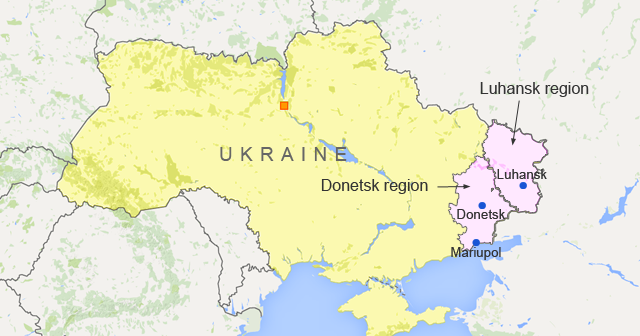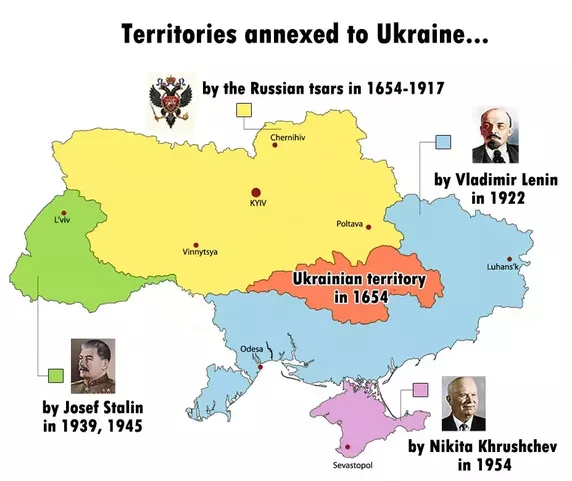yet, not in the nearest future. The world mass media have been sounding alarm about Russians marshalling their troops and moving them about their territory with the alleged intention of invading the aforementioned easternmost region of Ukraine and incorporating it into Russia just as it was done with the Crimea. The international atmosphere has been whipped up by Ukrainian President Zelensky, who has recently made a demand that Russia give back the Crimea. Kiev intends to take steps against Russian occupation – as they keep saying – of the peninsula and has even made suggestions that Germany – the country tied with Russia by means of one completed and one almost completed natural gas pipeline – render assistance. Obviously, Ukrainians believe that when the West expresses its support for Kiev’s ambitions, it means it in all seriousness.

Just to remind the reader. Ukraine was created by the Bolsheviks as a soviet socialist republic, one of the many making up the Soviet Union. Ukraine was called into existence the way Nebraska or California or Pennsylvania were. Initially the new state within the larger union-state only comprised those parts of Western Russia which for a couple of centuries belonged to – in different historical periods – Lithuania, Poland, the Polish-Lithuanian Commonwealth, Austria, and Austria-Hungary. The people living under non-Russian rule developed a slightly different language from Russian. Much the same is true of Belarus, at present a state, formerly a soviet socialist republic created on a chunk of territory that once belonged to Lithuania, then the Polish-Lithuanian Commonwealth. After the Soviets had established the Ukrainian Socialist Republic, they decided to carve a few regions out of southern Russia and join it to Ukraine. This is how the Donbass region became a part of Ukraine. The republic’s area and population grew larger and… more Russian in its ethnic composition. The latest chunk ceded by the Russian republic was that of the Crimea. In 1954 Chairman Khrushchev – of at least partly Ukrainian descent – arbitrarily took that decision. Nobody asked the residents of the Crimea whether they wanted to be shifted from Russian to Ukrainian jurisdiction. They did not care about that anyway because they all – Russians, Ukrainians, Tajiks, Lithuanians, Kazakhs – were citizens of the Soviet Union just as Texans or Virginians are citizens of the United States. When, however, the Soviet Union fell into pieces and particular republics became independent states, millions of people woke to a new reality: suddenly Russians ceased being Soviet citizens and became Lithuanian, Estonian, or Ukrainian citizens. Quite a change in someone’s life. When then the Kiev government started enforcing the Ukrainian language on all residents of Ukraine, Ukrainian Russians i.e. people living in eastern Ukraine – the Donetsk and Lugansk regions – rebelled. Imagine Texas or Arizona being incorporated into Mexico and then imagine that the authorities issue a decree according to which all residents of the two previously American states must speak Spanish rather than English.

The civil war taking place in the Donbass (the Donetsk and Lugansk regions) has its twists and turns, and it is waged with no end in sight. The local Russians enlist the support of Moscow against the Ukrainian troops. After the Crimea had been annexed by Moscow, the world has been expecting that the same will happen to the Donetsk and Lugansk regions. Yet, nothing of the sort has happened as yet. Why should it happen now? For Moscow, the Donbass is far more valuable as a part of Ukraine than a part of Russia. Why? First, the ongoing civil war destabilises Ukraine and keeps Kiev constantly occupied with this problem. Second, in the Donbass, Russia has a large footbridge from which it can infiltrate its neighbour and operate across its territory.
In 1920-1921, after an all-out war between Poland and the Soviet Union, during the peace talks, Warsaw demanded that the defeated Bolsheviks cede huge chunks of Russian territory. Much to their surprise, Moscow was willing to surrender to Poland much more than demanded by the Polish delegation. Why? If Warsaw had acquiesced to that proposal, Poland would have absorbed millions of Russian-speaking people confessing Orthodox Christianity, and by definition hostile to the Catholic, westernised Polish state. Moscow would have had a ready underground army, terrorist groups on call and support for its activities on Polish soil. A territorial gain is not necessarily in the best interests of a state!
The Donbass is Russian in that it is inhabited by Russians who by the twists of history were once assigned Ukrainian citizenship. Though naturally gravitate to Russia, it does not mean that Moscow will cater to their wishes, at least not now. Western media are whipping up a kind of hysteria because they may be commissioned to exacerbate the relations between Russia and the European Union, especially between Russia and Germany (remember, Germany was called on by Ukrainian politicians to help them regain the Crimea!) and thus prevent Berlin from cooperating with Moscow on the completion of Nord Steam 2. The Navalny affair was also envisaged as such a ploy. It did not make Berlin comply with American plans, so now the world is confronted with the possibility of yet another Russian– as they say – aggression against a sovereign – again as they love to stress – state: Ukraine.





One comment on “Russians will seize the Donbass”
you have the art of blowing hot and cold, saying one thing and its opposite … we know the method, as old as the world. Jews, Jesuits, and other intelligent people practice it. Well done!